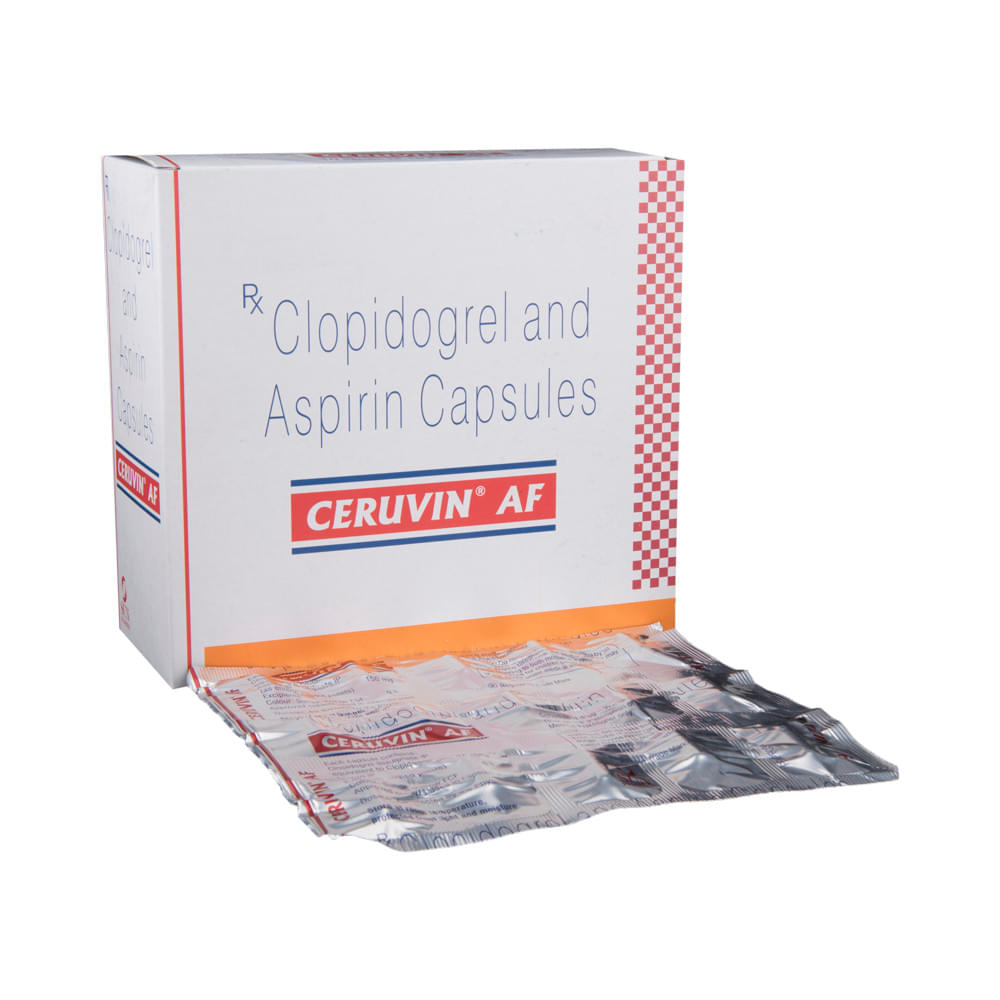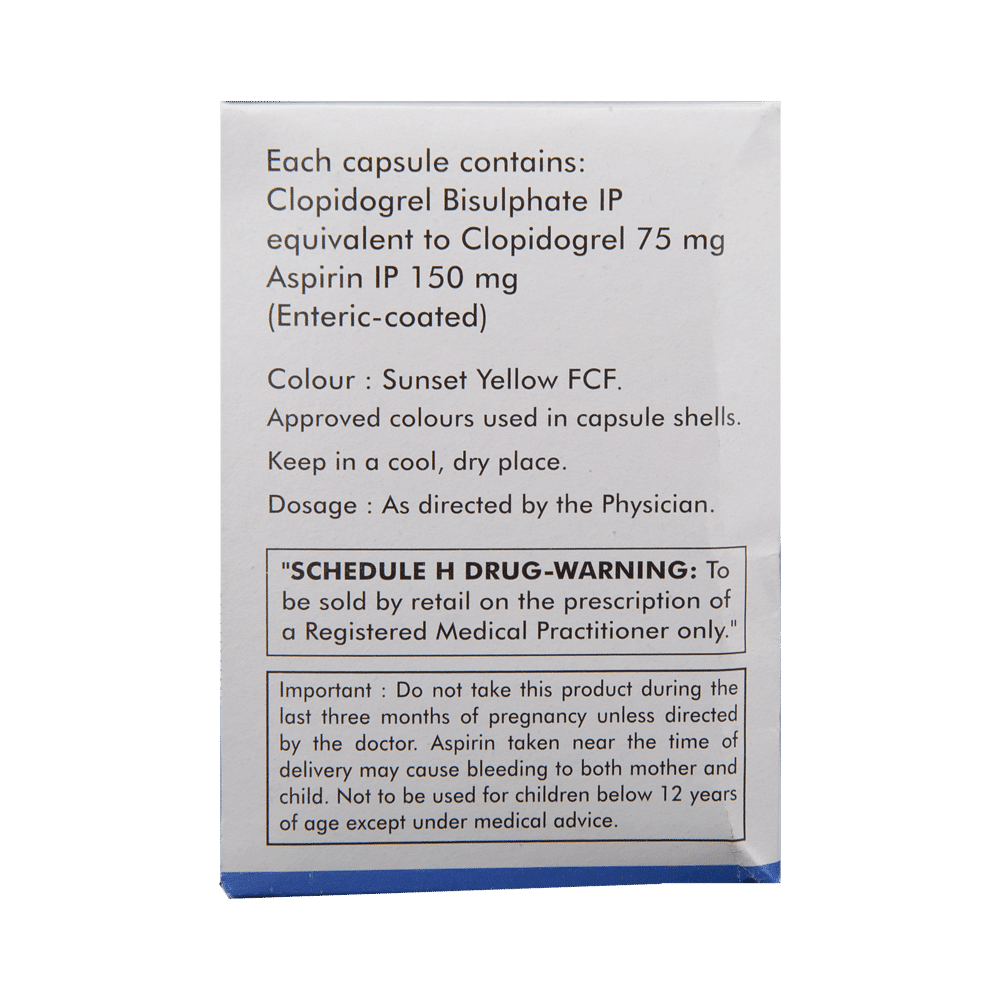
Opigrel A 150mg/75mg Capsule
Manufacturer
Henry Pharmaceuticals
Salt Composition
Aspirin (150mg) + Clopidogrel (75mg)
Key Information
Short Description
Opigrel A 150mg/75mg Capsule is a combination of two antiplatelet medicines used to reduce the formation of harmful blood clots in blood vessels.
Dosage Form
Capsule
Introduction
Opigrel A 150mg/75mg Capsule is a combination of two antiplatelet medicines or blood thinner used to reduce the formation of harmful blood clots in blood vessels. It is used to prevent a heart attack or stroke in people with heart disease. It is also used to treat acute coronary syndrome (ACS).
Directions for Use
Take this medicine in the dose and duration as advised by your doctor. Opigrel A 150mg/75mg Capsule is to be taken with food.
How it works
Opigrel A 150mg/75mg Capsule is a combination of two antiplatelet medicines: Aspirin and Clopidogrel which prevent heart attack. They work by preventing the platelets from sticking together and decrease the formation of harmful blood clots. It is also used to treat acute coronary syndrome (ACS).
Quick Tips
You have been prescribed Opigrel A 150mg/75mg Capsule to lower your risk of heart attack and stroke. Take it with food to avoid an upset stomach. It increases your risk of bleeding. Be careful while shaving, cutting fingernails or toenails or using sharp objects. Let your doctor know you are taking Opigrel A 150mg/75mg Capsule before undergoing any surgical procedure.
Related Medicines

Ceruvin AF Capsule

Clopitab-A 150 Capsule

Plagerine-A 150 Capsule

Clodrel Forte Capsule

Clopitex-A 150 Capsule

Clopisa 150mg/75mg Capsule

Clopinox-A Capsule

Antiban Asp 150 mg/75 mg Capsule

Livigrel A 150mg/75mg Capsule

Noplaq AS 150 mg/75 mg Capsule
Frequently asked questions
Why have I been prescribed Opigrel A 150mg/75mg Capsule?
You may have been prescribed Opigrel A 150mg/75mg Capsule if you had a heart attack, were treated with stents in your coronary arteries, or had coronary artery bypass graft surgery (CABG).
Is Opigrel A 150mg/75mg Capsule a blood thinner?
Yes, Opigrel A 150mg/75mg Capsule is a type of blood thinner. It works by preventing platelets from sticking together and forming clots, which helps prevent conditions like heart attack or stroke in people with heart disease, who have recently suffered a heart attack or severe heart-related chest pain (unstable angina).
How long do I need to take Opigrel A 150mg/75mg Capsule after stent insertion?
Your doctor will determine the exact duration for which you should take Opigrel A 150mg/75mg Capsule, considering factors such as the illness being treated, type of stent inserted, and any episodes of bleeding experienced during treatment. Typically, Opigrel A 150mg/75mg Capsule is prescribed for a minimum duration of 1 year. However, it is essential to follow your doctor's advice precisely to achieve maximum benefit from the medication. Do not stop taking Opigrel A 150mg/75mg Capsule without consulting your doctor first, as sudden discontinuation may increase the risk of clot formation in the stent, heart attack, and even death.
Can I drink alcohol while taking Opigrel A 150mg/75mg Capsule?
It is not recommended to consume alcohol while taking Opigrel A 150mg/75mg Capsule, as it may increase the risk of stomach bleeding. You may experience vomiting blood (which may appear bright red or black/dark brown like coffee grounds) or have bloody or black tarry stools. Consult your doctor if you are unsure.
What is the most important information I need to know about Opigrel A 150mg/75mg Capsule?
Opigrel A 150mg/75mg Capsule may cause serious or life-threatening bleeding. You may experience bruising easily, and it may take longer than usual for bleeding to stop even with minor injuries like small cuts while shaving. Seek emergency medical attention if you notice excessive or prolonged bleeding. Inform your doctor if you experience black tarry stools or blood in your urine. Be vigilant for signs of stroke, such as sudden numbness or weakness (one side or both sides of the body), difficulty walking, mental confusion, slurred speech, dizziness, or unexplained headache. Contact your doctor immediately if you develop any of these signs of stroke, as it can be fatal if left untreated.
Do I need to stop Opigrel A 150mg/75mg Capsule before surgery?
Your doctor will determine whether you need to stop taking Opigrel A 150mg/75mg Capsule before any surgery or treatment. Typically, if a surgery or treatment is planned beforehand, your doctor may stop Opigrel A 150mg/75mg Capsule a few days (usually 7 days) before the procedure due to the increased risk of bleeding during the procedure. Do not stop taking Opigrel A 150mg/75mg Capsule without consulting your doctor first.
Who should not take Opigrel A 150mg/75mg Capsule?
Opigrel A 150mg/75mg Capsule is not recommended for individuals who are allergic to it or any of its ingredients. Do not take Opigrel A 150mg/75mg Capsule if you have or have had severe liver disease, stomach ulcers, bleeding in the brain (stroke or transient ischemic attack, also known as TIA), or a bleeding disorder known as hemophilia (disease in which blood does not clot normally). Additionally, avoid taking Opigrel A 150mg/75mg Capsule if you are trying to get pregnant, already pregnant, or breastfeeding.
What if I forget to take a dose of Opigrel A 150mg/75mg Capsule?
If you forget to take a dose of Opigrel A 150mg/75mg Capsule, take it as soon as you remember. However, if it is almost time for your next dose, skip the missed dose and take the next scheduled dose. Do not double the dose to make up for the missed one, as this may increase the risk of developing side effects.
What should I avoid while taking Opigrel A 150mg/75mg Capsule?
Avoid activities that may increase your chances of bleeding. Be extra cautious while shaving or brushing your teeth to prevent bleeding. Also, avoid taking painkillers, but if you need to take one like ibuprofen for joint pain, headache, backache, etc., consult your doctor first. This is because taking painkillers with Opigrel A 150mg/75mg Capsule may increase the risk of developing a stomach ulcer and bleeding. Refrain from consuming excessive alcohol with Opigrel A 150mg/75mg Capsule, as it can irritate your stomach and lead to a stomach ulcer as well.


